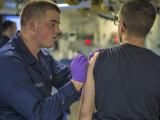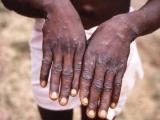Apr 13, 2004 (CIDRAP News) –British biotechnology company Acambis plc has temporarily stopped recruiting volunteers for clinical trials of the cell-culture smallpox vaccine it is making for the US government because at least three cases of myopericarditis have occurred in one of the trials.
The cases occurred in a phase 3 trial in which 1,132 volunteers who had never had a smallpox shot before have been vaccinated with either the Acambis vaccine, called ACAM2000, or Dryvax, the currently licensed smallpox vaccine, the company said in a news release. The statement didn't say which vaccine the myopericarditis patients had received. But an online report by the Financial Times, a British newspaper, said two of the cases were in Dryvax recipients. Three-quarters of the volunteers are receiving ACAM2000.
In addition, two possible cases of myopericarditis have occurred in other, smaller studies involving ACAM2000 and Dryvax, the company reported. But no cases have occurred in another phase 3 trial of the same vaccines in 1,752 volunteers who had never had a smallpox shot before, officials said.
Myopericarditis, or inflammation of the heart muscle and its lining, has been reported in 77 of 615,149 US military personnel who have received Dryvax over the past 16 months, according to a Department of Defense report issued last week. None of the cases were fatal. In addition, 21 suspected and probable cases of myopericarditis occurred in civilian healthcare workers who received smallpox shots in 2003, according to the Centers for Disease Control and Prevention (CDC).
The Acambis statement said, "Acambis' independent Data and Safety Monitoring Board (DSMB) recommended that enrolment into the studies be suspended pending further review and until additional data can be obtained." After that review, the company will consult with the Food and Drug Administration and CDC to determine its next steps, officials said.
Acambis is under contract to make 209 million doses of smallpox vaccine for the Department of Health and Human Services (HHS) as a precaution against the threat of a terrorist release of smallpox virus. Both the Acambis vaccine and Dryvax use vaccinia virus, a close relative of smallpox. The company's vaccine is grown in cell culture, unlike Dryvax, which was grown on the skin of calves. The hope is that the new vaccine will be purer and safer than the existing one, which can cause rare but serious complications.
Acambis said the volunteers in its trials have been monitored carefully because of the US data supporting a connection between smallpox vaccine and myopericarditis. Safety monitoring has included frequent monitoring for cardiac symptoms, serial electrocardiograms, and blood tests for cardiac injury.
"It is difficult to determine whether the three recent cases reported suggest a higher frequency of cardiac adverse events than expected from previous recent experience," the company said. "Surveillance for adverse events both during the era of routine vaccination and in the recent civilian and military vaccination programs was not as intense as is being performed in these controlled clinical trials. Nevertheless, subject safety is paramount and therefore the decision was made to suspend enrollment in these trials."
The Financial Times report quoted Gordon Cameron, Acambis chief executive, as saying that the myocarditis problem could delay the issuance of a US license for ACAM2000 but would not affect the company's $428 million contract with the US government.
See also:
Department of Defense smallpox vaccination safety summary as of Apr 7
http://www.smallpox.mil/event/SPSafetySum.asp
Feb 13, 2004, CDC report on complications in the civilian smallpox vaccination program
http://www.cdc.gov/mmwr/preview/mmwrhtml/mm5305a4.htm
Aug 21, 2003, CIDRAP News story, "Tests suggest Acambis smallpox vaccine may have safety advantage"


















